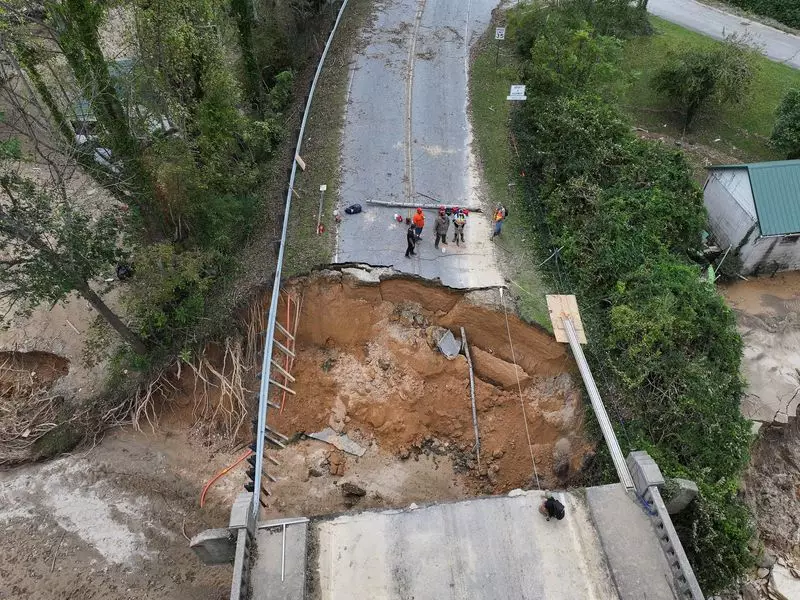The recent onslaught of Tropical Storm Helene has laid bare the vulnerabilities of communities in North Carolina and surrounding states. After making landfall as a hurricane in Florida, the storm continued its merciless advance, claiming lives and wreaking havoc across a swath of the southeastern United States. This has resulted in widespread devastation, leaving entire towns isolated and in desperate need of emergency supplies. As state and federal agencies rush to provide relief, the human cost of this catastrophe grows clearer.
On Monday, emergency crews commenced airlifting essentials—food and water—into remote towns severely impacted by the storm. Towns like Bat Cave, stripped of communications infrastructure and overwhelmed by floodwaters, are now described as “post-apocalyptic” by local officials. With more than 300 roads rendered impassable and thousands of residents displaced, the extent of devastation is staggering. The National Guard’s aerial support, which involves flying in tons of supplies, underscores the gravity of the situation across North Carolina.
The human stories emerging from this disaster speak volumes about the psychological toll that such tragedies take. Residents, left with only a fraction of their possessions, are confronting the unimaginable. For Aaron Smith and his family, for instance, the catastrophic rise of Hickory Creek changed their lives in an instant, uprooting their home and livelihood. Their experience is echoed throughout communities that have been similarly devastated.
The hurricane’s toll escalates as rescue operations unveil the grim reality of the situation. Upwards of 100 fatalities have been confirmed across several states, with North Carolina alone reporting at least 56 deaths. The figures may rise further as authorities reach isolated regions, essentially cut off from rescue efforts. As families continue to await news of their loved ones, the emotional strain of uncertainty adds another layer to this tragedy.
Georgia and South Carolina also report significant loss of life and severe infrastructure damage, showcasing the widespread impact of Helene. The lack of power affecting 1.8 million homes and businesses further complicates recovery efforts, making it difficult for affected individuals to access vital resources like food and clean water.
The impact of storm Helene is vividly illustrated through the destruction of properties and essential infrastructure. Bat Cave, a small community that now appears unrecognizable, is just one of many towns facing an uncertain future. Emergency responders have recounted how homes were swept away, bridges collapsed, and roadways obliterated, leading to a scene reminiscent of natural disaster zones often seen only in movies.
Firefighters and emergency personnel have taken extraordinary measures, even going so far as to deny private rescue attempts when they deemed it unsafe, demonstrating the sheer danger posed by the fragile state of remaining infrastructure. The urgency of their efforts speaks to the immediate need for not just rescue missions but for a comprehensive recovery plan that prioritizes rebuilding efforts.
In response to the calamity, both federal and state entities have mobilized quickly to gather resources and assist victims. FEMA has deployed over 1,200 federal personnel to aid in recovery, while local government officials continue to assess destruction and deploy their own resources as necessary. North Carolina Governor Roy Cooper has called for “significant resources” for both imminent and long-term recovery efforts, marking the scale of this disaster.
President Biden has also taken notice of the situation, planning to visit the affected areas shortly, offering not only his administration’s physical support but also addressing the overarching issue of climate change, which he attributes as a contributing factor. This unprecedented event, described as a “1,000-year event” by climate scientists, raises critical questions about regional and national readiness for handling natural disasters exacerbated by climate change.
As recovery efforts continue and more information comes to light, the focus remains on rebuilding not just infrastructure, but also the lives of those affected. The stories of resilience and community bonding will emerge even from this darkness, serving as a testament to the indomitable human spirit in face of adversity. However, the long-term challenge of creating a more resilient society that can withstand future storms like Helene looms large. The tragedy endured by individuals and communities calls for reflection on the need for proactive measures in mitigating the impact of such disasters—a call to action that must resonate in policy decisions moving forward.

